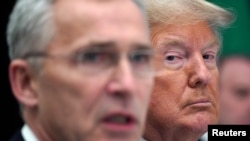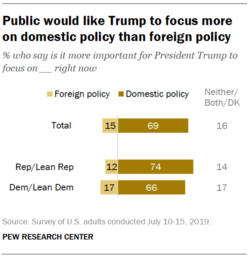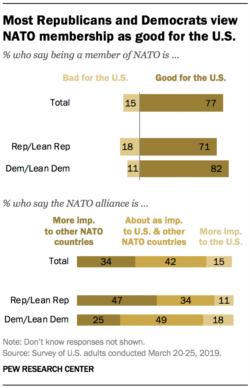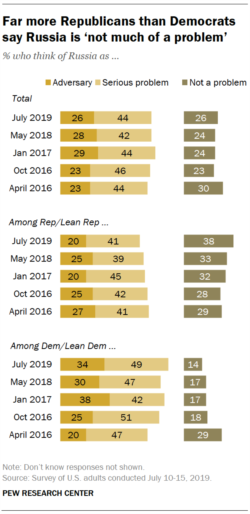On Dec. 13, the U.S. Senate Committee on Foreign Relations unanimously approved a bipartisan bill aimed at preventing President Donald Trump from withdrawing from NATO. To become law, the legislation must be passed by the full Senate and House of Representatives. Support from two-thirds of senators is needed to overturn a potential veto by Trump.
Reporting on the bill, Russia Today, a state-owned agency, quoted the head of a Moscow think tank that advises the Kremlin on U.S. policy.
Vladimir Batyuk, head of the Center for Military and Political Research at the State Institute of the U.S. and Canada, said the legislation should be seen as “part of a titanic battle between American nationalism and American liberal globalism.”
“Donald Trump embodies the first camp, and half of the Americans support him on this issue, believing that the U.S. spends too much [in terms of] manpower and resources on foreign policy,” Batyuk said.
The Senate committee acted amid uncertainty over Trump’s intentions toward NATO.
In May 2017, in Brussels, Trump scolded the leaders of fellow NATO member nations for insufficient military spending. As a presidential candidate, Trump suggested the U.S. might not come to the defense of NATO member states which failed to meet guidelines calling on members to spend at least 2 percent of their gross domestic product on defense.
In January 2019, The New York Times quoted senior administration sources who claimed Trump privately said he wanted the United States to withdraw from NATO.
Vladimir Batyuk’s claims are misleading on several fronts.
First, his remark that the Senate committee’s pro-NATO bill was a result of a “titanic battle” between two opposing camps in U.S. politics ignores the fact that the bill passed unanimously by the committee’s Republicans and Democrats.
Second, the priority that Americans place on domestic affairs over foreign policy is not exclusive to Trump administration; it has been a decades-long trend with “only modest partisan differences,” polling agencies say.
A Pew Research Center survey conducted in July 2019 found that 69 percent of respondents agreed that, “it is more important for the president to focus on domestic policy than foreign policy.” Only 15 percent supported focusing on foreign policy.
The result was “little different” than during Barack Obama’s presidency, Pew said.
As for the implication that half of American support the president’s position on NATO, survey results are mixed.
In a Pew Research Center survey conducted in March 2019, 77 percent of the respondents -- “including large majorities in both parties” -- said being a NATO member was good for the United States. Those numbers were “essentially unchanged from April 2016,” the agency reported.
Earlier, in November 2018, a CBS News poll found that 56 percent said they disapproved of the way Donald Trump was handling relations with U.S. allies in Europe, while 36 percent approved.
In July 2018, a Quinnipiac University poll found that 78 percent of Americans agreed that, “Donald Trump should defend all of America’s NATO allies, if necessary,” while 16% said he should not.
On the other hand, a YouGov survey released in April 2019 to commemorate the 70th anniversary of NATO found that only 44 percent support U.S. membership in alliance down 3 percentage points from 2017. Ten percent opposed NATO membership and 29 percent were undecided.
In an October 2017 Pew Research Center survey of Americans, 48 percent of the respondents said NATO was not doing enough to help solve world problems.
In addition, polls have shown a change in partisan attitudes toward Russia in the United States – a significant factor, given that NATO was created to defend Europe against the Soviet Union.
In the July 2019 Pew poll cited above, 65 percent of Democrats said Russia’s power and influence were major threats to U.S. well-being, while only 35 percent of Republicans said the same thing.








